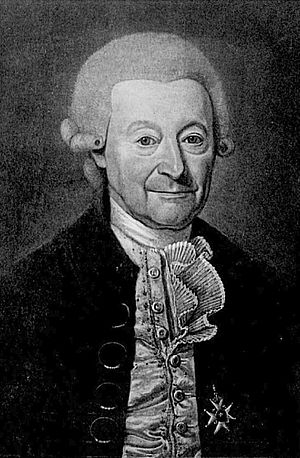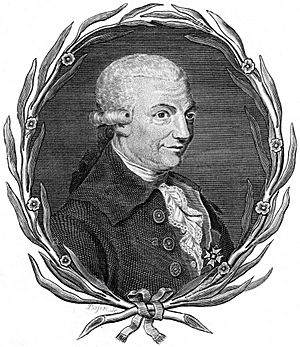Johann David Michaelis facts for kids
Johann David Michaelis (born February 27, 1717 – died August 22, 1791) was an important German scholar and teacher. He studied the Bible and ancient languages. His family was known for being very good at studying Hebrew and similar languages. This made the University of Halle famous during a time called Pietism. He was also part of the Göttingen School of History, a group of historians.
Life and Work
Michaelis was born in Halle an der Saale on February 27, 1717. His family followed a religious movement called Pietism. They believed that studying ancient languages was very important for the Church. Michaelis was trained for a life of learning by his father. At the University of Halle, he learned a lot about philosophy from Siegmund Jakob Baumgarten. He also developed a strong interest in history.
In 1739, Michaelis finished his main university paper. In it, he argued that the special marks (called vowel points) in Hebrew were very old and important. He visited England and the Netherlands in 1741 and 1742. In Holland, he met Albert Schultens, whose ideas about language greatly influenced him.
In 1745, Michaelis became an assistant professor (called Privatdozent) of oriental languages at the Göttingen. He became a full professor in 1750 and stayed at Göttingen until he died in 1791. From 1771 to 1785, he was the editor of a scholarly magazine called Orientalische Und Exegetische Bibliothek.
Michaelis translated parts of an English novel called Clarissa. He also translated other English writings about the Bible. This showed he liked new, freer ways of thinking. His studies of Eastern languages changed after reading Schultens' work. Michaelis was very interested in history, old objects, and especially geography and natural science. He had even started university studying medicine. He later said he sometimes wished he had become a doctor.
Michaelis helped inspire the famous Danish Arabia Expedition (1761–67). This journey was led by Carsten Niebuhr and Peter Forsskål. Niebuhr brought back ancient writings called cuneiform from the expedition. These writings were some of the first clues used to understand cuneiform. Michaelis was very interested in the natural side of the Bible. He helped people start studying ancient Hebrew life as part of wider ancient Eastern history.
You can learn about Michaelis's personality from his own writings. He was elected a Fellow of the Royal Society in 1789. This is a very respected group of scientists.
Family
Michaelis came from a family of scholars.
- His great-uncle, Johann Heinrich Michaelis (1668–1738), was a leader at a special school for studying the Bible and Eastern languages. He also wrote an important Hebrew Bible.
- Michaelis's daughter, Luise Michaelis, was briefly engaged to a writer named Carl Grosse.
- His father, Christian Benedikt Michaelis (1680–1764), was also a professor at the University of Halle. He was a good scholar, especially in the Syriac language.
- Another daughter, Caroline, became an important figure in early German Romanticism. She was married to a critic named August Wilhelm von Schlegel and later to a philosopher named Friedrich Wilhelm Joseph Schelling.
 | Toni Morrison |
 | Barack Obama |
 | Martin Luther King Jr. |
 | Ralph Bunche |



